By Janet Phelps
A lack of knowledge and basic skills can have devastating effects on adults who want to go to college. Just ask Amber*, a 20-something student who came into my office at McLennan Community College last week and told me she wanted to go back to school.
Amber had recently lost her job at a fast-food restaurant and had been unable to find work since. In her two semesters at MCC before she dropped out, Amber had racked up $7,000 in student debt by accepting her entire financial aid package — subsidized and unsubsidized loans — and using the money for living expenses while enrolled in college.
How many credits had she earned? Not nearly enough. Amber still needs to complete her developmental education requirements – collegespeak for remedial classes that students who aren’t college material must take to catch up.
Facing repayment of her debts without a job or a college degree seems impossible to Amber, a first-generation college student who is financially independent and will be considered in default on her loans next month.
One possible way to help Amber and students like her is to help them get a stronger start into college by helping them perform better on the state college entrance test.
Around 60 percent of students entering MCC test into development education annually through the TSI, the state’s college entrance test. Those students must complete classes to improve skills they need for college-level courses before they can start taking courses that count toward a degree. For students like Amber, taking these classes burns through financial aid without improving earning potential or economic status.
A state-wide effort is being made to help students avoid developmental education classes. Local schools and colleges are also working to fill this gap.
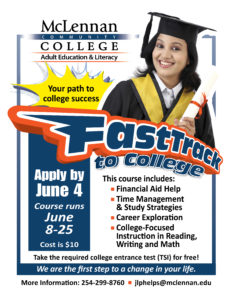 Adult Education and Literacy for the Heart of Texas is among the organizations tasked with helping these students. That’s why we’re creating classes meant to help transition adults from all walks of life to get into college and be successful.
Adult Education and Literacy for the Heart of Texas is among the organizations tasked with helping these students. That’s why we’re creating classes meant to help transition adults from all walks of life to get into college and be successful.
Because the MCC program is funded by the Texas Workforce Commission, we have the unique ability to offer these not-for-credit classes at a very low cost to students.
The first FastTrack to College class will equip students with the college knowledge they need for success including financial literacy and financial aid knowledge, career awareness, computer literacy, time management, and study skills. The class will also prepare students academically in reading, writing, and math to take the TSI, which is included in the $10 cost of the class. The class will be taught by MCC instructors and supported by officials from MCC and TSTC whose goal is for students to transition into college courses at those institutions in the fall.
This class is the first of what will become regular offerings of college-readiness classes through Adult Education to help students test out of developmental classes and build the confidence and skills they need to successfully complete their degrees.
So what can you do?
Refer people who want to go back to college and need extra support to this class. The process of signing up includes filling out an application, taking a placement test and completing a short goal-setting interview with a career navigator Adult Education.
For many Wacoans who are stuck in dead-end jobs, a technical certificate or associates degree from TSTC or MCC is the key to pulling an entire family into a stable financial position.
Our hope is that our efforts — along with those being made by other departments and organizations in this community — will boost the economic status of low-skilled adults and help students like Amber overcome knowledge gaps that threaten her success. Here are the details:
FastTrack to College class
Monday – Thursday
June 8 – 25, 2015
8:30 a.m. to 12:30 p.m.
McLennan Community College campus
To learn more about or to sign up for the FastTrack to College Class, contact Adult Education at 299-8053 or email Janet at [email protected]. Click here for a flyer to share with anyone you know who might be interested in this program.
*Amber is a pseudonym for a student who did not give permission for her name to be used on this blog.
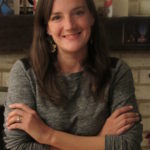 Janet Phelps is the Transition Specialist for Adult Education and Literacy for the Heart of Texas at McLennan Community College. She loves helping students, reading, and running at Cameron Park.
Janet Phelps is the Transition Specialist for Adult Education and Literacy for the Heart of Texas at McLennan Community College. She loves helping students, reading, and running at Cameron Park.
The Act Locally Waco blog publishes posts with a connection to these aspirations for Waco. If you are interested in writing for the Act Locally Waco Blog, please email [email protected] for more information.
By Katie Grovatt
Waco: I came here as a Baylor student not knowing what to expect from the city where my school is located. My quest: to go out and discover what my new home city has to offer. What I found: the Waco Downtown Farmer’s Market, a place where I can be part of the heart of a community.
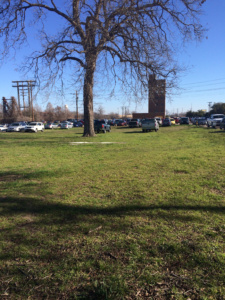 Located next to the river, close to the downtown intersection of Webster and University Parks, the farmer’s market is where local venders, people, dogs, children and live music unite to create an atmosphere of joy, especially on a beautiful Saturday morning. My first trip was on Valentine’s Day. I was excited to strap up my loving canine companion, Rosie, and see what the market had in store for us! As we rolled into a parking spot at half past 9 (the market opens at 9 a.m.), the sounds of music, laughs, and food sizzling on grills met my ears.
Located next to the river, close to the downtown intersection of Webster and University Parks, the farmer’s market is where local venders, people, dogs, children and live music unite to create an atmosphere of joy, especially on a beautiful Saturday morning. My first trip was on Valentine’s Day. I was excited to strap up my loving canine companion, Rosie, and see what the market had in store for us! As we rolled into a parking spot at half past 9 (the market opens at 9 a.m.), the sounds of music, laughs, and food sizzling on grills met my ears.
Families were touring the shady path lined with booths. Children were shoving freshly made sweets into their mouths, laughing, and hula hooping on the bright lawns. As I started my own tour through the many different vendor tents, Rosie pulling my arm off in the process, my eyes landed on a man selling freshly grown pecans.
His name was John Cogll and he was selling his grandchildren’s pecans. The business, known as “Fresh Native Pecans” is located in McGregor, Texas. They utilize wild pecans growing around Central Texas and season them with tasty spices such as “Apple Pie” or “Mesquite Smoked”. I was offered a sample as I talked to Cogll about where I could purchase some of these tasty pecans. “HEB isn’t too interested in ‘healthy’ or organic foods,” Cogll answered when I asked if I could buy these at our local grocery store. The pecans do however get distributed to grocery stores all around the area, as far as Albuquerque, New Mexico. These delicious nuts can also be purchased at ThePecanShop.com. But I would recommend traveling on Saturday yourself to the farmer’s market and purchasing a bag personally from John Cogll.
After tasting local and freshly harvested pecans, Rosie dragged me to a small booth handing out fresh samples of Indian Food. Scolding my over eager dog and untangling myself from the leash that had wrapped around my body, I smiled at the lady and asked about her history selling Indian Food. Her name was Christina Allen. She’s originally from a town outside of Austin, but currently works for the commercial kitchen known as Lamba’s. Started four years ago by an Indian couple, Garima and Gurpuet Lambo, Lambda’s is located near Austin. They sell their food at many different farmer’s markets in the Central Texas area. I sampled the delicious Spinach Pakora. Completely gluten free, Pakora is a crunchy snack bursting with a creamy flavor from the special dipping sauce known as the Royal Dip — delicious! And, I am not even a huge fan of Indian food.
Allen herself was never an Indian food fanatic either; she just picked up the job to make some extra money. After sampling the food though — authentic, healthy, and so tasty — she loves it. She still wouldn’t want to go to just any Indian restaurant, but Lamba’s food is one of her favorites. Her go-to meal is the Chicken Tikka Masala, a dish made up of freshly roasted chicken seasoned with spicy and creamy sauces. Whether or not you’re an Indian food expert, Lamba’s has options for everyone. Even the pickiest of eaters won’t be disappointed with this yummy cuisine.
 Next I followed the aroma of fresh-brewed coffee to a long and winding line of people waiting for fresh cookies, soft and warm muffins, and coconut cream lattes. I made my purchase and received my coffee in a simple white cup with the logo Double B Farms. The family running the tent was very busy with their customers so I sweetened my coffee and headed over to the live music.
Next I followed the aroma of fresh-brewed coffee to a long and winding line of people waiting for fresh cookies, soft and warm muffins, and coconut cream lattes. I made my purchase and received my coffee in a simple white cup with the logo Double B Farms. The family running the tent was very busy with their customers so I sweetened my coffee and headed over to the live music.
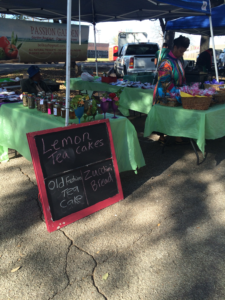 Sipping my coffee and listening to a talented girl playing acoustic versions of everything from Taylor Swift to Katy Perry, I surveyed what I had just experienced. I had discovered a welcoming place, full of joy, and full of stories. I smiled as each person walked by, carrying their “souvenirs” from the farmer’s market. Each person’s purchases tells a little different story about who they are and what they like. Each one with an individual character, and each one supporting the local businesses of Waco as a whole.
Sipping my coffee and listening to a talented girl playing acoustic versions of everything from Taylor Swift to Katy Perry, I surveyed what I had just experienced. I had discovered a welcoming place, full of joy, and full of stories. I smiled as each person walked by, carrying their “souvenirs” from the farmer’s market. Each person’s purchases tells a little different story about who they are and what they like. Each one with an individual character, and each one supporting the local businesses of Waco as a whole.
It made me think. Though each one of us has our own interests, our own busy lives within this town, each of us are here for a reason and are a part of something bigger. We are people, we are joy, and we are Waco. Even though we each play a different part, we support each other. As we gather together on Saturday mornings to shop and eat and listen to music and enjoy each other’s dogs and children, we are the heart of the city, and it is a big, beautiful heart!
 This Act Locally Waco blog post was written by Katie Grovatt. Katie, a New Jersey native, is studying journalism at Baylor University. She has fallen in love with Waco since she has gotten here, and loves to spend her time exploring, meeting the many different people that make this city thrive, and writing about her adventures. Currently she is working at the Wacoan Magazine as an editorial intern, and running track and cross country for the Baylor Track & Field Team. Her dog, Rosie, is her faithful side kick and equally enjoys exploring and meeting the people of Waco.
This Act Locally Waco blog post was written by Katie Grovatt. Katie, a New Jersey native, is studying journalism at Baylor University. She has fallen in love with Waco since she has gotten here, and loves to spend her time exploring, meeting the many different people that make this city thrive, and writing about her adventures. Currently she is working at the Wacoan Magazine as an editorial intern, and running track and cross country for the Baylor Track & Field Team. Her dog, Rosie, is her faithful side kick and equally enjoys exploring and meeting the people of Waco.
The Act Locally Waco blog publishes posts with a connection to these aspirations for Waco. If you are interested in writing for the Act Locally Waco Blog, please email [email protected] for more information.
By Matthew Polk
This is an exciting time to live in Waco. Downtown revitalization, Baylor football in McLane Stadium, Fixer Upper, food trucks…the list of great things about Waco is long and growing. There is a refreshing energy that comes from living in a place that is growing and seeing success. Everyone wants to be part of a winning team.
Most of us would agree that when a community grows and prospers, the benefits spill over to all of the community members in one way or another. A revitalized downtown means a more beautiful city, more places to shop and eat, more jobs. A winning sports program means more exciting entertainment options and visits from College GameDay. Local TV celebrities give us something to talk about with strangers on the airplane when we tell them we’re from Waco, TX. In other words, when Waco wins, we all win. This idea seems to make sense to most people.
But how often do we flip that idea on its head and look at it from another perspective? How often do we think about the fact that, when one Wacoan benefits, it’s good for the rest of us? It’s easy to see that when the community as a whole is flourishing there are benefits for us individually—sometimes it’s harder to see how one person’s success can lead to benefits for the rest of the community (unless that person happens to be named Art, Bryce, Chip, or Joanna).
Prosper Waco is about the idea that for the community of Waco to flourish, Waco’s citizens and families have to flourish. It’s about the idea that the more successful we are individually, the stronger we will be as a community. We have a special opportunity to seize the momentum Waco has and harness it in a way that benefits all members of our community. Prosper Waco is about making sure that all Wacoans have a chance to capitalize on our recent success and, by doing so, to contribute to the growing momentum.
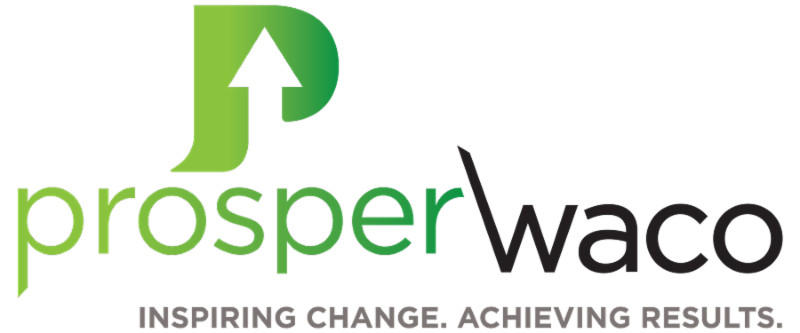 So what is Prosper Waco? Simply put, it’s a community-wide initiative to make Waco a better place for all of us to live. More specifically, our mission statement is “to build an environment in which all people can measurably improve their education, health, and financial security.” Education…health…financial security. They are intertwined in all our lives. Our educational achievement affects our job prospects, which affects our health, which affects our financial security…and so on.
So what is Prosper Waco? Simply put, it’s a community-wide initiative to make Waco a better place for all of us to live. More specifically, our mission statement is “to build an environment in which all people can measurably improve their education, health, and financial security.” Education…health…financial security. They are intertwined in all our lives. Our educational achievement affects our job prospects, which affects our health, which affects our financial security…and so on.
But how do you go about helping people improve their education, health, and financial security throughout an entire community? These are big, complex areas of life with lots of moving parts and many issues to consider. In order to make positive changes in these areas, a community has to agree on some goals that we can work toward together. This approach is called collective impact—a community working together to achieve goals that will benefit everyone.
If more children are academically and socially prepared to begin Kindergarten, our schools will be stronger. If more students (especially students from economically-disadvantaged backgrounds) complete a college certificate or degree, we will have a more dynamic workforce, which means our economy will grow, more jobs will be available, and more businesses will thrive. If more people in Waco have access to primary healthcare, our local hospitals will not need to provide millions of dollars a week (a week!) in uncompensated care and will be able to provide even better care for everyone. If more young people find a job, they will have a better chance of establishing a career that will provide their family with financial security and boost the local economy.
To achieve any of these things will take a coordinated effort from all of us.
So who is us? Who is Prosper Waco? You are…so are your family, your friends, your co-workers, classmates, and fellow church members. Prosper Waco is all of us pulling in the same direction to achieve some very big, very ambitious goals that will benefit everyone because more of us will be succeeding on an individual level. Prosper Waco is non-profits, businesses, churches, schools, and government agencies aligning their services and communicating about how they can work together to achieve common goals and better serve the community.
How can you be Prosper Waco? How can you get involved? Here are some ways:
- Talk to your neighbors and friends about Prosper Waco and what you’d like to see change for the better in our community. We are all the “grassroots” that will make this community-wide initiative work, and it will take people connecting with other people to make sure that Wacoans are able to make the most of the opportunities that develop out of this initiative.
- If you are a community member who has always wanted to be part of making Waco better but didn’t know where to start, call us and we can help you find volunteer opportunities with great local organizations.
- If you are a “big picture” person with a strategic mind, we’d love to have you join our steering committees to help develop community-wide strategies for achieving our goals.
- If you lead a local organization (non-profit, business, church, etc.) and want to coordinate your efforts with others to achieve common goals, give us a call or click on the Prosper Waco Affiliate logo at www.prosperwaco.org to indicate your organization’s interest in joining this movement.
If you’d like to learn more about Prosper Waco, give us a call at 741-0081, or visit us on the web, Facebook, or Twitter. #IamProsperWaco, and so are you. Together, we can build a Waco that works for all of us.
 Matthew Polk is Executive Director of Prosper Waco. Prior to that, he served as Superintendent of Rapoport Academy Public School. He and his wife attended Baylor, and after spending a few years in the northeast, they returned to Waco to raise their family. They have four children, ages 8 to 3 months. You can contact him at [email protected].
Matthew Polk is Executive Director of Prosper Waco. Prior to that, he served as Superintendent of Rapoport Academy Public School. He and his wife attended Baylor, and after spending a few years in the northeast, they returned to Waco to raise their family. They have four children, ages 8 to 3 months. You can contact him at [email protected].
The Act Locally Waco blog publishes posts with a connection to these aspirations for Waco. If you are interested in writing for the Act Locally Waco Blog, please email [email protected] for more information.
by Sara Beth Stoltzfus
Being a parent can be tough. Returning to the role of parent as a 65 year old can be exhausting.
Now, I do not know this from personal experience. I am a 28 year old childless woman. I know this from what I have seen and heard from the grandmas and grandpas I have worked with through the Methodist Children’s Home (MCH) Family Outreach Grandparents as Parents Program (GAPP).
The Grandparents as Parents Program offers supportive in-home services to grandparents raising their grandchildren. The program includes case management, information and referrals for community resources, workshops, assistance with legal issues, and support groups.
Through this program, I have had the privilege of walking alongside young grandparents, older grandparents, grandparents with money, and grandparents with almost no income at all. Some grandparents come to our program seeking legal support, some because they are not making it financially, and some come because their grandchildren have been through so much physical and emotional trauma that they are constantly battling the problem behaviors that result. Some grandparents are just looking for someone to talk with, vent with, and cry with…someone to let them know that they are not alone.
All are coming to our doors because they love their grandchildren.
More and more grandparents are raising their grandchildren. In the United States, approximately 5.8 million children are living in grandparent homes. Similarly, almost 2 million children are living in the home of other relatives. (AARP, 2015). The AARP writes that grandparent caregivers and the children they are raising are frequently isolated. “They lack information about the range of support services, resources, programs, benefits, laws and policies available to help them successfully fulfill their caregiving role.” (AARP, 2015).
Grandparents serving as parents face a whole range of issues that the typical parent may not face. The U.S. Census found that grandparents living with a grandchild in 2012 were more likely to face poverty than those who did not live with a grandchild (Williams, 2012). A 2013 article in the Washington Post cited that 20% of grandparents raising grandchildren are living in poverty (Bahrampour, 2013). Grandparents are often not financially prepared for children to enter their home. This means they often have to take on a second, or even third job to pay for their grandchildren’s needs. Sometimes grandparents quit jobs that they once had in order to be able to adequately care for a child with special needs. While there is some financial help available for grandparents in specific situations, there is not enough financial assistance as many of these families need to feed growing children and themselves. Grandparents are also not getting any younger and often have health issues of their own to deal with. These financial and physical health challenges are highly prevalent amongst grandparents raising grandchildren. The need for greater support for these courageous grandparents is significant.
One of the greatest joys of working with the GAPP Program is facilitating a support group for these grandparents. I love watching one grandparent light up with deep understanding as another grandparent shares their story. I feel great satisfaction hearing a grandparent say they no longer feel so alone. Grandparents serving as parents are dealing with a lot of emotions. They shed tears regularly over their adult child’s drug addiction, another child’s domestic violence charges, the death of an adult child and the many other reasons their grandchild is staying with them. They wish for more for their adult children, but they work hard to set boundaries in order to keep their grandkids safe. Every story is different, but none is without complications.
Many grandparents feel very blessed to have a second chance to parent again. They know they’ve learned lessons over the years. They are often more patient the second time around. While the journey is not easy, most grandparents I’ve talked to feel very blessed by the entrance of their grandchildren into their lives.
We need to support our grandparents serving as parents. They are spending their golden years running around with toddlers, staying up into the night with a traumatized 8 year old, and learning to use a computer for the first time in order to relate to their teenage grandchild. All of the grandchildren that come to live with their grandparents have experienced some type of trauma. This is often trauma the grandparents are not prepared to address. Grandparents as parents need not only programs, such as GAPP and support groups, but a community of support. Grandparents as parents are indeed unsung heroes to our communities’ children.
One quote I often share with the grandparents I work with is:
“The more healthy relationships a child has, the more likely he will be to recover from trauma and thrive. Relationships are the agents of change and the most powerful therapy is human love.” –Bruce Perry
This quote also inspires and strengthens me in this work.
If you know a grandparent you would like to refer to our program or would like more information, please call 254-750-1263.
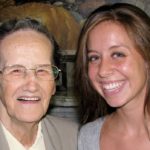 This Act Locally Waco blog post was written by Sara Beth Stoltzfus. Sara Beth is a case manager at the MCH Family Outreach office through the Methodist Children’s Home. Sara Beth received her master’s degree in Social Work from the University of Texas at Austin. Sara Beth is originally from Pennsylvania but has been living in Texas for almost 6 years, 4 of which have been spent in Waco.
This Act Locally Waco blog post was written by Sara Beth Stoltzfus. Sara Beth is a case manager at the MCH Family Outreach office through the Methodist Children’s Home. Sara Beth received her master’s degree in Social Work from the University of Texas at Austin. Sara Beth is originally from Pennsylvania but has been living in Texas for almost 6 years, 4 of which have been spent in Waco.
The Act Locally Waco blog publishes posts with a connection to these aspirations for Waco. If you are interested in writing for the Act Locally Waco Blog, please email [email protected] for more information.
by Gary Lee Webb, DTM
Do you have trouble getting through a job interview? Are you uncomfortable speaking in front of people you do not know? Would you like to be better at responding to a surprise question? Or better at marshalling your thoughts and presenting your ideas? Perhaps you have a job, but wish to move up to a supervisory position? Or perhaps, you just wish to be a better speaker/presenter at church, work, or other organizations?
If any of these apply to you, Toastmasters International can help. Toastmasters is an international non-profit organization. We are 300,000 people helping people to learn how to communicate better, and we have been doing it for 90 years. Toastmasters offers participants a way to practice communication skills in a supportive environment, a way to meet more experienced speakers and see them in action, and a way to expand one’s horizons across the world. We are a self-paced program, with helpful, individual mentors, usually divided into chapters of roughly 20 people, generally meeting weekly or bi-weekly (see directions below on how to get info on local chapters). There is high level training available for those who want it,
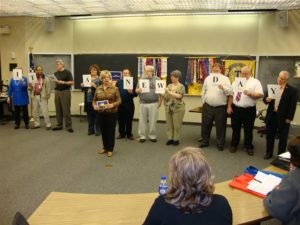 Toastmasters provides a very friendly environment in which beginners can learn, in front of a non-critical audience, that speaking is not hard. Participants go on to learn basic presentation skills, and, as they improve, gain the confidence that they are capable and even excellent speakers. They can either participate in a group (Speechcraft) or learn at their own pace (with a mentor); either way they will get positive criticism, aimed at helping them improve. As they practice, they will periodically see more experienced presenters (at club, contest, or conference), which may help guide their steps to being a better presenter. Eventually, participants discover that it does not matter whether the audience is friendly or not – they know they speak well.
Toastmasters provides a very friendly environment in which beginners can learn, in front of a non-critical audience, that speaking is not hard. Participants go on to learn basic presentation skills, and, as they improve, gain the confidence that they are capable and even excellent speakers. They can either participate in a group (Speechcraft) or learn at their own pace (with a mentor); either way they will get positive criticism, aimed at helping them improve. As they practice, they will periodically see more experienced presenters (at club, contest, or conference), which may help guide their steps to being a better presenter. Eventually, participants discover that it does not matter whether the audience is friendly or not – they know they speak well.
At the same time they are learning public speaking skills, participants are also learning how to handle those surprise questions, learning to marshal their thoughts, and how to respond well. This is a valuable skill particularly in an interview. Interviewers often resort to surprise questions, to see how the applicant responds. A sage response after brief thought could be the key to getting the job.
Toastmasters also develops leadership skills: listening, evaluating, organizing your thoughts, speaking in a way that you are believed, persuasive, or inspirational…in short, getting your message across and convincing people of its wisdom…these skills are a strong foundation for any leader. Participants also learn useful skills like organizing and running a meeting well, or putting together and managing a major project. I know people who used their new skills to get that supervisor position they wanted.
This is our mission statement: “We provide a supportive and positive learning experience in which members are empowered to develop communication and leadership skills, resulting in greater self-confidence and personal growth.” I believe we do it very well indeed: I have seen people become great speakers, authors, and leaders. It is a deep and wide program, with many options for learning and participation.
Members who wish to hold the highest honors demonstrate what they have learned by teaching others. As participants grow in the program they have opportunities to teach new speakers in Speechcraft, teach teenagers in Youth Leadership, teach management skills, and to teach leaders or trainers, as well as many other options. Not all of these are required, but I have done several to my benefit. I can proudly say I am a Distinguished ToastMaster (DTM), signifying I have delved deeply into the program, learning both communication and leadership.
What makes Toastmasters especially valuable is not just the practice, but the immediate feedback and the good role models. The manuals not only train the speaker, they guide the evaluator in what to look for, so that he may better tell the speaker how to improve. And after 90 years of improvement, the manuals are very good.
Moreover, the member will see better speakers to emulate. If the ones in his or her chapter are not good enough, there are other chapters to visit. Twice per year, there is a series of contests, in which members can compete against members from other chapters. The contest winners compete across larger regions, and then across the state. The international contest climaxes with the winner from each of the almost 100 districts world-wide competing in semi- and world finals. Last year (2014), I saw D.J. Swinyar win in the District 25 contest and get flown to Malaysia for the 2014 finals. Contests are optional, only about 10% of members compete, but those who are interested can learn, just by watching. There are also many other optional training opportunities.
In short, Toastmasters is a unique opportunity to improve oneself: as a speaker, as a leader, and in many other ways. The skills are valuable, and so are the friendships. We generally do our best to help each other out, and we tend to be willing to meet and network across the globe. I have become acquainted with astronauts, top businessmen, world champions, and great authors; I personally know toastmasters in three continents. The basic cost is $72 per year (prorated for a partial year); individual chapters may add local dues (there are seven chapters in the Waco area). And there is a $20 initial fee for a new member (pays for the initial manuals). That is incredibly cheap compared to other options for this kind of development. Toastmasters is a very cost-effective way to learn.
I hope you will consider coming and visiting one of our chapters – guests are always welcome. If you like what you see, if you think it will help you grow into a more capable person, I hope you will consider joining. For details of when and where we meet, you can e-mail me at [email protected] or check out the international web site, www.toastmasters.org, and put in your zip code after clicking “Find a Club” on the top bar.
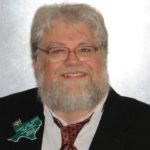 Gary Lee Webb is a 17-year resident of Waco. He recently completed a successful year as a president’s distinguished Division Governor for Toastmasters International, guiding 29 central Texas chapters. His credits include film chairman for the 1982 West Coast Science Fiction Convention, over 360 public speeches, assisting at both high school and adult speech contests, and over 40 publications (14 fiction). He is 59, married 38 years, with 4 daughters.
Gary Lee Webb is a 17-year resident of Waco. He recently completed a successful year as a president’s distinguished Division Governor for Toastmasters International, guiding 29 central Texas chapters. His credits include film chairman for the 1982 West Coast Science Fiction Convention, over 360 public speeches, assisting at both high school and adult speech contests, and over 40 publications (14 fiction). He is 59, married 38 years, with 4 daughters.
The Act Locally Waco blog publishes posts with a connection to these aspirations for Waco. If you are interested in writing for the Act Locally Waco Blog, please email [email protected] for more information.
by Dawn Wible
- A friend blankly stares across the table while you check your texts. As she anxiously awaits an answer, you have no idea what she just said.
- Your four year old is describing his new friend at school, but you are busy scrolling through the newsfeed and missing the whole story.
- Vegging on the couch was the agenda for the night but instead you are responding to a work email at 11:15pm, because really, what are “work hours” these days anyway?
We have all found ourselves in these situations, myself included. It truly is a sign of the times.
The two questions I ask myself are: “Why am I choosing to put my relationships on the back burner?” and “When and where is the best time to be on my device?” I believe we do not even realize we are making these small and influential choices. Statistics and studies are actually showing a change in our brain function due to technology addiction. Many neurologists and psychologists are pointing to our dependence on technology as the root of many mental, physical, emotional, spiritual, social and relational issues. These issues range from poor academic or job performance, to job loss, lack of social connectedness, sleep disorders, divorce and in some cases even death.
There’s a crucial conversation happening in our culture concerning the problem of tech addiction, and my family and I want to be a part of the solution! This idea has become so important to the mental health of my family that we started a local movement: Talk more. Tech less.
Talk More Tech Less is for myself, and essentially anyone who uses technology in this tech heavy culture. This is not an anti-technology movement; it is a pro-relationship movement. I’m a mom of three BOYS and technology is very much a part of my family’s life. But, we struggle with the overuse and addiction that causes tantrums, irritability, ignoring, zoning out…you get the picture. Like most of you, my phone is my home and work computer in hand. It helps me to be efficient – way more efficient than I would be without my device. It is valuable, but it also distracts me from the life going on right in front of me. I realized a few years back that I needed to shift my perspective and priorities. I saw it not only in my own life, but in society as well. We can get lots of information, facts and communication from our phones, but what we’re missing is the emotion, the conversation, and the connection that should come with communication.
Talk More Tech Less was birthed from mentoring and spending time with teenagers. My husband, Matt, runs a Waco based organization called Field Guides that mentors young men through outdoor activities. We have seen first- hand the benefits of getting young men away from all the distraction and overuse of technology, video games, smart-phones and computers and getting them outside! As the CRC Health Group says, “There is a strong body of research confirming that direct contact with nature increases mental health and psychological and spiritual development. Benefits include stress reduction, a sense of coherence and belonging, improved self-confidence and self-discipline, and a broader sense of community.”
At Field Guides summer camps we have participants take one-week breaks from their phones. Working with these guys year after year our eyes have been opened to some true dependency issues involving technology. We have also been privileged to see the breakthroughs that happened as they embraced this process. With those experiences as background I began researching tech dependency and addiction stats and saw the great need in this culture for balance and freedom.
Last summer we had the campers construct boxes for their phones. We encouraged them to take the boxes home and use them with their families. The idea is that family members place their phones in these “Detox Boxes” during meal times and other important moments during the day and night.
Our own family’s experience with technology balance, my research into this subject, and the success of this “detox box” idea convinced me that other people could benefit from a structured way to explore and reduce dependency on technology. That led me to create the Talk More Tech Less 30 Day Experience. The 30 day experience is designed to strengthen relationships and create awareness about the overuse of technology. It is a guide to empower individuals, families, and groups to find balance, leading to greater connection. I hope it will help those who use it gain control of this growing concern in our culture and world.
The 30 Day Experience includes a custom made “Detox Box”, 30 daily note cards, a journal and a decal. The box is created to place our devices in during strategic times throughout the day. They are locally crafted here in the 254, by Sticker Universe and Hole in the Roof Marketing. The daily note cards are a true journey to healthy technology usage. Each card takes approximately 90 seconds per day, so as not to take up time, but to give it back. Those involved are actually surprised at how much time they have on their hands during the 30 days.
Research shows negative effects from the lack of face-to-face, eye contact, physical, spiritual and emotional contact. In the 30 Day Experience we pool all that information and combine it with practical ways to deal with and replace this dependency issue. Talk More Tech Less is designed to bring conversation and connection back to our culture. We’d love you to be a part of this movement! For more information please visit us at www.talkmoretechless.com
 Dawn Wible is the creator of Talk More. Tech Less. She is a Waco resident and graduate of Baylor University. Her husband, Matt founded and runs an outdoor ministry, Heart of Texas Field Guides, that mentors young men through outdoor activity. Together they raise 3 amazing boys, Levi, Jude and Ty. Dawn finds life in deep connection with family and friends, volunteering, kayaking, cooking, jogging and she loves a good party.
Dawn Wible is the creator of Talk More. Tech Less. She is a Waco resident and graduate of Baylor University. Her husband, Matt founded and runs an outdoor ministry, Heart of Texas Field Guides, that mentors young men through outdoor activity. Together they raise 3 amazing boys, Levi, Jude and Ty. Dawn finds life in deep connection with family and friends, volunteering, kayaking, cooking, jogging and she loves a good party.
The Act Locally Waco blog publishes posts with a connection to these aspirations for Waco. If you are interested in writing for the Act Locally Waco Blog, please email [email protected] for more information.
By Cecelia Rodriguez
Do you have an older friend, or perhaps a friend with a disability, who is on a limited income? Booth Garden Apartments might be the perfect home for him or her. We are proud of the environment we have created here at Booth Gardens, and we would like to make sure that those who might need a place like Booth know that it is here for them.
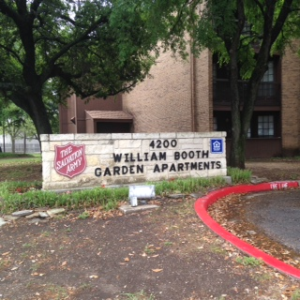 The Booth Garden Apartments are an independent housing community owned and managed by the Salvation Army. We provide safe and comfortable living conditions at affordable costs for seniors, and those with federally defined disabilities, who have limited incomes. At Booth Garden Apartments, residents can live in an atmosphere of love, acceptance and encouragement.
The Booth Garden Apartments are an independent housing community owned and managed by the Salvation Army. We provide safe and comfortable living conditions at affordable costs for seniors, and those with federally defined disabilities, who have limited incomes. At Booth Garden Apartments, residents can live in an atmosphere of love, acceptance and encouragement.
The Booth Gardens Apartments are one-connected building, but they are actually two separate projects: William Booth (which faces N. 19th) and Catherine Booth Garden Apartments (which faces Stewart Dr.). William Booth was first opened for occupancy in 1983 and Catherine Booth was later opened for occupancy in 1997.
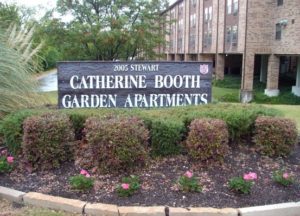 The buildings are four stories high, and together contain 196 one bedroom apartments. The apartments include added amenities especially designed to benefit our two target audiences: persons 62 years of age or older, and persons 18 or older who have a federally defined disability. William Booth is for those who are 62 years of age or older and also for those that are at least 18 years of age with a federally defined disability. Catherine Booth is just for senior citizens, 62 years of age or older.
The buildings are four stories high, and together contain 196 one bedroom apartments. The apartments include added amenities especially designed to benefit our two target audiences: persons 62 years of age or older, and persons 18 or older who have a federally defined disability. William Booth is for those who are 62 years of age or older and also for those that are at least 18 years of age with a federally defined disability. Catherine Booth is just for senior citizens, 62 years of age or older.
We contract with HUD (U.S. Department of Housing and Urban Development) which provides subsidized rent for our residents. The apartments are reserved to be safe, comfortable homes for people with limited income. Annual income limitations (which are subject to change annually) are currently $19,150.00 per year for a single person and $21,900.00 per year for couples. The exact rent charged is based on a formula which takes into account the residents’ adjusted gross income, assets and medical expenses.
Here are some of the things residents appreciate about living at Booth Gardens:
- A group of our residents have formed a very active “Tenant Council” which meets monthly. They lead numerous activities ranging from trips to lunch fundraisers and are continuously working to be a voice for our residents.
- We offer a variety of activities including weekly bus trips to H-E-B and Walmart.
- There is a 24 hour response system in case of emergencies. Emergency pull-cords are available near the beds and in the bathrooms of each apartment and can be put to use in case of a medical emergency.
- Multi-faith groups come-in to conduct spiritual programs. We also enjoy a variety of educational programs hosted by local home healthcare agencies.
- We have a resident chaplain, Major Harvey Harwell. He leads regular Bible studies and devotion times and offers counseling to those who need it.
- Our resident services coordinator, Mrs. Barbara Parnell, is also available to help residents meet their own needs.
- Domesticated pets are welcome.
- We have a total of 3 laundry facilities.
- Although we are independent living, many of our residents have private contracts with home-health care agencies that enable them to remain independent.
- We have a partnership with “Meals and Wheels” program which provides lunch meals to our residents three days a week.
- Friends for Life is a partner and has helped some of our residents meet financial management and budgeting needs. This also helps them to stay independent longer.
It has been an honor and a pleasure to serve with The Salvation Army Booth Garden Apartments for the past 10 years. I cherish every moment participating in and assisting with housing for senior citizens. Several years ago I lost my mother, who was disabled, and shortly after, an elderly aunt. They are my inspiration for being part of this wonderful ministry. Like many others, they were on limited means of income, and faced health challenges. They struggled to maintain the aging, deteriorating home in which they lived. We hope that our residents are able to be as independent as possible, for as long as possible and receive the dignity and respect they deserve in a safe and affordable home. If you know someone who is looking for a home who you think might be a good fit for the Booth Gardens, please contact us! You may contact me, Cecilia Rodriquez by email at [email protected], or our Assistant Director, Rachel Sheridan at [email protected], or call either of us at (254) 757-2242. We look forward to hearing from you!
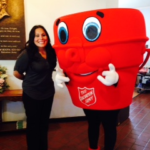 This Act Locally Waco blog post is by Cecilia Rodriquez. Cecilia began her ministry with The Salvation Army Booth Gardens Apartments as the receptionist 10 years ago and is now the Director of both properties. She is a Certified Manager of Housing and Certified Occupancy Specialist through the National Center for Housing Management. She has a passion for senior citizens and also enjoys being an active part in her children’s lives coaching in her spare time. She is family-driven and thrives on helping to make a difference in people’s lives as she carries out the mission of The Salvation Army.
This Act Locally Waco blog post is by Cecilia Rodriquez. Cecilia began her ministry with The Salvation Army Booth Gardens Apartments as the receptionist 10 years ago and is now the Director of both properties. She is a Certified Manager of Housing and Certified Occupancy Specialist through the National Center for Housing Management. She has a passion for senior citizens and also enjoys being an active part in her children’s lives coaching in her spare time. She is family-driven and thrives on helping to make a difference in people’s lives as she carries out the mission of The Salvation Army.
The Act Locally Waco blog publishes posts with a connection to these aspirations for Waco. If you are interested in writing for the Act Locally Waco Blog, please email [email protected] for more information.
By David Saucedo
The Reinforced Earth Company is a precast concrete company that is part of a national and international conglomerate comprised of construction, technology and concession companies, among others. We are located in China Springs and we employ between 150 to 160 people, many of which are Waco residents.
My personal passion for community change and empowerment has played out in many ways over the last four to five years, but the last two years have been amazing! When I was hired at Reinforced Earth in 2013, I never thought the most enlightening and fulfilling work so far would take place at this company, but it has. I was blessed with opportunities, and I advanced to become the Safety Coordinator in late 2013. This promotion opened doors that I would have never imagined and allowed me to work with some terrific people who have taught me a great deal about what we call “foundational employment” – employment that is foundational to a stable lifestyle.
The Reinforced Earth Company’s Waco plant, managed by James Ashley, is paving a new road in employee development. We focus on a quality made product, produced in a timely manner, as safely as possible. But most importantly we are aiming to promote healthy and stable lifestyles to the men in our community that work here. From a business perspective, it goes without saying that a high turnover rate interferes with those goals and makes it very hard to establish maximum efficiency. In 2014 our company on average employed 58 workers per month through local staffing agencies. This not only increased the cost of producing our product, but it also led to a workforce with less experience and more potential for mistakes or injuries.
We began our work in foundational employment by using encouraging messages in our safety toolbox meetings. For example, we would use words like, “This is a family out here,” or “We want you to use Reinforced Earth as a foundation for your family.” We encouraged car pools to help employees who didn’t have transportation, showing that we are here to help. We introduced simple budget spreadsheets and encouraged employees to ask how they could escape the check-to-check lifestyle. Our most recent, and I think our most fruitful step has been referring and encouraging our employees to a local psychiatrist that is covered by our insurance. In some cases we even covered the copay for employees who are more serious about improving their standard of living.
I’m very proud to report that this month we will be reporting that fewer than 20 employees are working at Reinforced Earth through local staffing agencies. We have increased production and decreased our production hours by improving our production procedures and focusing on better training and efficiencies. By no means would our efforts be considered a comprehensive study, but we are seeing results and we associate these results with the investments we are making in our employees.
From these experiences, I’m very confident that a company dedicated to promoting strong foundations in the lives of their employees will see improvements in the quality of their workforce, a decrease in their turn over, a reduction in overhead, and — the icing on the cake — an increase in their profits. What would our community look like if more companies were encouraged to promote strong and healthy foundations in the lives of their employees? That’s a question I have been asking myself more and more.
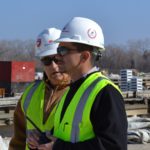 This Act Locally Waco blog post was written by David Saucedo. David is a local minister with Life Church Waco and has committed the last 8 years of his life to impacting his community in a positive way. David has a loving wife, Michelle and three beautiful children, Lianna (7), Isaiah (4) and Isaac (10 Months).
This Act Locally Waco blog post was written by David Saucedo. David is a local minister with Life Church Waco and has committed the last 8 years of his life to impacting his community in a positive way. David has a loving wife, Michelle and three beautiful children, Lianna (7), Isaiah (4) and Isaac (10 Months).
The Act Locally Waco blog publishes posts with a connection to these aspirations for Waco. If you are interested in writing for the Act Locally Waco Blog, please email [email protected] for more information.
By Alfred Solano
What do new bike lanes, the Hippodrome reopening, Franklin Place, Dichotomy, Lula Jane’s, Muddle, Tinsley Place, Barnett’s Pub, and McLane Stadium all have in common? They’re all recent developments that have collectively changed the landscape of Downtown Waco during the past few years.
In 2010, we, as a community, began to dream and imagine what we want our city to look and feel like. The Imagine Waco plan was developed and adopted. Five years later, we look around and see a new, livelier downtown—one which we proudly call home. However, there is still much to accomplish. As we plan for the next five years of growth and development, we need to update the Imagine Waco plan and include everyone’s voice.
When the Imagine Waco plan was adopted in 2010, goals included activating the riverfront, building connections for people to get around, and creating an organization that implements development in Downtown Waco. More than two-thirds of Imagine Waco’s proposed action items are in the realization process. Over the past five years, public space investments have included improvements to sidewalks and crosswalks, added bike lanes, and new trees that have been added along streets to upgrade the walkways. Future shared spaces will include the transformation of the Heritage Square parking lot and the riverfront. Some of the private sector developments (leveraged by public investments) include Franklin Place, Tinsley Place, the Hippodrome, and Lula Jane’s. A small area planned for the “Near Northside” area around 15th and Colcord resulted in increased public and private investments, including streetscape improvements that beautified the intersection.
Organizational developments included the creation of the Downtown Development Corporation, 1,000 Friends of Waco, and efforts by the Sanger Heights and North East Riverside Neighborhood associations to improve their areas and business districts, according to the Imagine Waco plan.
Behind the scenes, the City of Waco has embedded principles from Imagine Waco into planning and engineering decisions. This paradigm shift has changed the design and the feel of projects and Downtown Waco altogether.
As we look at the first years of Downtown Waco’s renaissance and the series of projects that have been accomplished by private investors and the City during the last five years, we look ahead with excitement and anticipation about what is next for our city.
Five years ago, the Waco community dreamed together…and now it’s time to dream again!
What makes The Imagine Waco plan achievable and exciting is that it is designed by the people who live and work in the Waco area for the benefit of the entire Waco community. We want your dreams and aspirations to be a part of the Imagine Waco update. Next week, there will be severral opportunities for your voice to be heard. Everyone is invited and encouraged to give their input about the future of Downtown Waco.
- Monday, April 13th, The Jubilee Theater @ 6PM
(1315 North 15th Street, Waco, TX 76707) - Tuesday, April 14th, The Cen-Tex Hispanic Chamber of Commerce @ 6PM
(915 LaSalle Avenue, Waco, TX 76701) - Wednesday, April 15th, The Greater Waco Chamber of Commerce—1,000 Friends of Waco Meeting @ 10AM
(101 South 3rd Street, Waco, TX 76701) - Thursday, April 16th @ The Eastern Waco Development Corporation, 6PM
(715 Elm Street, Waco, TX 76704)
Is there something that was missed or left out of the initial plan? Are there some good things in Waco that could be made great? What do you want Downtown Waco to be known for? Come share your thoughts and let us know.
Waco’s beautifully diverse culture deserves your continued support. Let’s continue to work together to build up Waco in a way that benefits everyone!
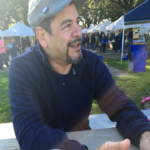 Alfred Solano was raised in Waco and is the Sales Manager for Texas Document Solutions. He and his wife Rachel are passionate about our city’s current trends and future possibilities. Alfred is the Vice President of the Business Resource Center, Waco’s downtown development corporation. He has served on the Board of Directors since its formation in 2011, representing the Cen-Tex Hispanic Chamber of Commerce.
Alfred Solano was raised in Waco and is the Sales Manager for Texas Document Solutions. He and his wife Rachel are passionate about our city’s current trends and future possibilities. Alfred is the Vice President of the Business Resource Center, Waco’s downtown development corporation. He has served on the Board of Directors since its formation in 2011, representing the Cen-Tex Hispanic Chamber of Commerce.
The Act Locally Waco blog publishes posts with a connection to these aspirations for Waco. If you are interested in writing for the Act Locally Waco Blog, please email [email protected] for more information.
By Janae Griffiths
We are all busy people. We go about our days checking tasks off our lists, sometimes putting little thought into what we are actually doing. Often, this is harmless—we get everything done and no one gets hurt in the process. But, for those of us who have the opportunity to walk alongside someone in difficult circumstances or to offer assistance in a unique way, rushing through can do more harm than good.
I had not given this much thought until a few weeks ago, when I met with a wonderful woman named Stella. Stella lives here in Waco, and due to some life circumstances has found herself to be the recipient of multiple social services in our community. She shared with me part of her story—a part that made me uncomfortable. Stella spoke of feeling forced to become her own advocate, of not knowing what resources were available to her or how to tap into them. She felt like she couldn’t find anyone who would take the time to explain the available resources to her.
She told me about how she has sometimes felt like she was just another item to be checked off of someone’s to-do list. She felt like she was falling through the cracks, but had no way to stop it.
“The professionals need to be proactive in spreading information,” she explained. “They need to have the passion to go above and beyond, not just rush through.”
I didn’t know how to respond to her at first. I wasn’t with Stella as she made her way from place to place seeking help. I don’t know how the people working with her actually responded, the words they actually said, the looks on their faces, or the tone of their voices. I don’t know the pressures they were under, or how long their days had been, or even how Stella treated them. I certainly don’t know their intentions. I don’t know if they felt empathy, or annoyance, or kindness, or frustration. I don’t know if they tried their absolute best to help, or if they did indeed feel like Stella was just “another item to be checked off.”
I only know how Stella felt.
“In some places I felt valued, but in many places, I did not,” Stella explained. From her point of view, the people who worked with her seemed to expect that she would automatically know what was available to her, when she felt like no one had ever clarified what services she qualified for and which she did not. She felt uncomfortable and short on information.
As a graduate student at Baylor School of Social Work, I have spent the past two years interning for various Waco nonprofits and working to address needs in our community. One of the key values of the social work profession—which we are taught right at the start of Baylor’s program—is the inherent dignity and worth of every individual. I absolutely believe that every human has dignity and worth, and I am fairly certain that the Waco nonprofit and social service community as a whole believes the same. But, while I may believe those things in my mind, Stella’s story made me start to think about how much more challenging it is to honor those values in my day to day actions.
Of course social service professionals shouldn’t just rush through their work. We all know that. But, in the day in and day out busyness of the work day, it is easy to do.
Fortunately, Stella is a strong woman with a strong personality. She quickly educated herself on the resources available and became an advocate for herself and others that she knew. But, as she pointed out to me, not everyone can easily become their own self-advocate, especially individuals whose primary language isn’t English.
I deeply appreciate Stella sharing her experience with me. I have been reflecting on her words in the weeks since, and they have reminded me about why I entered the field of social work in the first place. I want to be someone who meets people where they are, recognizes them for who they are, and cheers for them as they take steps to become more. My hope is that I, as a member of the social service community in Waco, can approach my work with a renewed sense of the dignity and worth of each individual I have the opportunity to serve. My hope is that I never rush through my work, but take the time to treat each client with kindness and offer as much assistance as I am able.
I hope that I always remember Stella and how she feels. I hope I always remember how uncomfortable it feels not to have the information you need, how bad it feels to be treated like “another item on the list,” how scary it feels to be “falling through the cracks.” I hope that my actions with each person who comes my way will reflect the values I so fervently believe.
 This Act Locally Waco blog post was written by Janae Griffiths. Janae is originally from Chicago, but has been happy to call Waco her home for almost six years! She is finishing her Master of Social Work degree from Baylor University, and currently interns at the Texas Hunger Initiative. She is passionate about issues of poverty and justice, especially in our community.
This Act Locally Waco blog post was written by Janae Griffiths. Janae is originally from Chicago, but has been happy to call Waco her home for almost six years! She is finishing her Master of Social Work degree from Baylor University, and currently interns at the Texas Hunger Initiative. She is passionate about issues of poverty and justice, especially in our community.
The Act Locally Waco blog publishes posts with a connection to these aspirations for Waco. If you are interested in writing for the Act Locally Waco Blog, please email [email protected] for more information.
